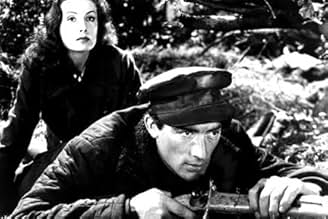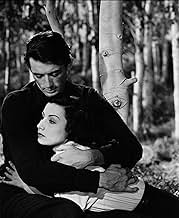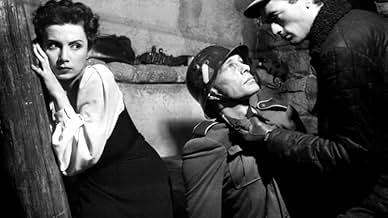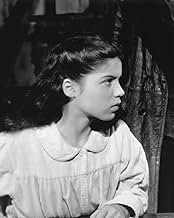CALIFICACIÓN DE IMDb
6.1/10
1.5 k
TU CALIFICACIÓN
Agrega una trama en tu idiomaA heroic guerrilla group fights back against impossible odds during the 1941 German invasion of the Soviet Union.A heroic guerrilla group fights back against impossible odds during the 1941 German invasion of the Soviet Union.A heroic guerrilla group fights back against impossible odds during the 1941 German invasion of the Soviet Union.
- Dirección
- Guionistas
- Elenco
- Nominado a 1 premio Óscar
- 3 premios ganados y 1 nominación en total
Tamara Toumanova
- Nina
- (as Toumanova)
Glen Vernon
- Mitya
- (as Glenn Vernon)
Edward L. Durst
- Petrov
- (as Edward Durst)
Maria Bibikov
- Vera
- (sin créditos)
William Challee
- Ducrenko
- (sin créditos)
Gretl Dupont
- Mariya
- (sin créditos)
Charles H. Faber
- German Corporal
- (sin créditos)
Erford Gage
- Col. Prilenko
- (sin créditos)
Peter Helmers
- Von Rundhol
- (sin créditos)
Adolf E. Licho
- Anton
- (sin créditos)
- Dirección
- Guionistas
- Todo el elenco y el equipo
- Producción, taquilla y más en IMDbPro
Opiniones destacadas
This tribute to Russian resistance in World War II gave Gregory Peck his opportunity for a starring film screen debut. No walk-ons, or bit parts are in Peck's career resume. He was billed a star from the beginning.
Not that Days of Glory was the greatest of debuts. In fact it was only in his second film, The Keys of the Kingdom for which he got his first Oscar nomination that made him a big star. Still Peck as the stoic and brooding Russian peasant resistance leader certainly had star quality written all over him.
Now that the Cold War is over we can appreciate the Russian contribution to defeating Nazism without getting hung up over Communism. The Russians took a quick study in what defeated Napoleon and applied those lessons to World War II. Where you see the German Army in the Ukraine in Days of Glory is roughly how far they advanced into the Soviet Union. Those partisans that Peck heads are on the cutting edge as factories are being transported and rebuilt in the Urals and east of same and the Red Army is being reorganized. Joe Stalin is also looking a military leadership team to beat the Nazis.
The Russian people took a tremendous toll and it was the great worry of both Roosevelt and Churchill up to the Allied invasion of Normandy that Stalin might just make a separate peace. If he had the world would be very different.
Peck's love interest was dancer Tamara Toumanova who plays a dancer caught up in the partisan movement. As an actress she's a great dancer, she's seen to better advantage in Alfred Hitchcock's Torn Curtain where she concentrates on dancing.
Days of Glory did get an Oscar nomination for Special Effects, but despite that it's essentially an A picture from a B picture studio, RKO. Still it's not a bad last stand story and a decent enough debut for Gregory Peck.
Not that Days of Glory was the greatest of debuts. In fact it was only in his second film, The Keys of the Kingdom for which he got his first Oscar nomination that made him a big star. Still Peck as the stoic and brooding Russian peasant resistance leader certainly had star quality written all over him.
Now that the Cold War is over we can appreciate the Russian contribution to defeating Nazism without getting hung up over Communism. The Russians took a quick study in what defeated Napoleon and applied those lessons to World War II. Where you see the German Army in the Ukraine in Days of Glory is roughly how far they advanced into the Soviet Union. Those partisans that Peck heads are on the cutting edge as factories are being transported and rebuilt in the Urals and east of same and the Red Army is being reorganized. Joe Stalin is also looking a military leadership team to beat the Nazis.
The Russian people took a tremendous toll and it was the great worry of both Roosevelt and Churchill up to the Allied invasion of Normandy that Stalin might just make a separate peace. If he had the world would be very different.
Peck's love interest was dancer Tamara Toumanova who plays a dancer caught up in the partisan movement. As an actress she's a great dancer, she's seen to better advantage in Alfred Hitchcock's Torn Curtain where she concentrates on dancing.
Days of Glory did get an Oscar nomination for Special Effects, but despite that it's essentially an A picture from a B picture studio, RKO. Still it's not a bad last stand story and a decent enough debut for Gregory Peck.
Vladimir (Gregory Peck) leads a group of guerrillas against the Nazi invaders in the forests of Russia. His small group is waiting for the order to attack. It finally comes with the message "The snow will fall".
The film is well acted with tense moments, eg, when the German soldier makes his escape with only Nina (Tamara Toumanova) in the hideout to defend herself alone against him. The group dynamics are well portrayed within this troupe of rebels and there is a very human element to the story. There are poignant scenes including Nina's silence when Mitya (Glenn Vernon) is taken by the Germans and the film has a memorable ending. It's patriotic but it's still a good film.
The film is well acted with tense moments, eg, when the German soldier makes his escape with only Nina (Tamara Toumanova) in the hideout to defend herself alone against him. The group dynamics are well portrayed within this troupe of rebels and there is a very human element to the story. There are poignant scenes including Nina's silence when Mitya (Glenn Vernon) is taken by the Germans and the film has a memorable ending. It's patriotic but it's still a good film.
Days of Glory was the first relatively big budget film Jacques Tourneur was given opportunity to direct after success of his horror trilogy (Cat People, I walked with the Zombie and Leopard Man).
The particularity of this picture is that it was a debut film for all of it's cast of actors including Gregory Peck who later became one of Hollywood's major stars. Days of Glory is also one of those few openly pro-soviet films that were made in Hollywood during WW-2 when United States and Soviet Union were allies in fighting against Nazi Germany. But this fact doesn't diminish the quality of the film, though some propaganda elements are present in the story, which is about a group of Russian partisans fighting guerilla war against German Nazi troops in occupied Russia.
Overall, Days of Glory is an interesting WW-2 drama with a good story and a cast of interesting characters brought to life by a group of wonderful actors in their first starring role in a film. 7/10
The particularity of this picture is that it was a debut film for all of it's cast of actors including Gregory Peck who later became one of Hollywood's major stars. Days of Glory is also one of those few openly pro-soviet films that were made in Hollywood during WW-2 when United States and Soviet Union were allies in fighting against Nazi Germany. But this fact doesn't diminish the quality of the film, though some propaganda elements are present in the story, which is about a group of Russian partisans fighting guerilla war against German Nazi troops in occupied Russia.
Overall, Days of Glory is an interesting WW-2 drama with a good story and a cast of interesting characters brought to life by a group of wonderful actors in their first starring role in a film. 7/10
During the 1941 invasion of Russia by the Nazi's the odds are overwhelming as the German army marches across the land. However resistance among the brave Russians makes up with heart what it lacks in sophistication and size.
One such outfit is a small group of guerrilla soldiers lead by Vladimir. The new arrival of an 'outsider' creates tensions within the group but the capture of a German soldier offers the possibility of information and the potential for a demoralising strike at the invading army as well as his attempted escape helping the group trust one another again.
Perhaps understandably the Russian/German front has been largely ignored by Hollywood in the past few decades and even now it is possible that Days Of Glory is only increasing in circulation because the embarrassment factor has faded. During the cold war, nobody really wanted a WWII propaganda piece that shows the Russians (our enemy) as upright, heroic and American (!). However now we are all in the War on Terror together, I notice this film has started being seen more than it was ten years ago. I was attracted to this by the director and the presence of Peck however this is far from being one of Tourneur's famous films and Peck was in his first screen role. Essentially this is a big 'thank you' to the Russian soldiers by putting them in a story where they talk endlessly about why they are fighting while falling in love, looking heroic and sacrificing their lives. It is as basic and uninspiring as all that sounds and it smacks of a film that puts propaganda first and entertainment second.
This is not to say that it doesn't try because it does, with some action, some human drama and the standard wartime romance. It is not terrible but it does get a little dull at times and has far too much heavy handed preaching while the emotional music swells in the background. The cast features a surprising amount of people in their screen debuts I'm not sure if that was deliberate but it doesn't show that much. Peck shows the sort of furrowed brow and screen presence that made him a famous leading man while the rest of the cast do OK in average characters who are either jovial, heroic or brave depending on what point the film is trying to get across.
Overall this is an interesting film because it is unusual to see an American propaganda film bigging up the Russians. It has some involving action towards the end but mostly it is too talky and preachy, relying on music and heroic sacrifice to pull our heartstrings rather than writing real people who we can get emotionally involved with and care about.
One such outfit is a small group of guerrilla soldiers lead by Vladimir. The new arrival of an 'outsider' creates tensions within the group but the capture of a German soldier offers the possibility of information and the potential for a demoralising strike at the invading army as well as his attempted escape helping the group trust one another again.
Perhaps understandably the Russian/German front has been largely ignored by Hollywood in the past few decades and even now it is possible that Days Of Glory is only increasing in circulation because the embarrassment factor has faded. During the cold war, nobody really wanted a WWII propaganda piece that shows the Russians (our enemy) as upright, heroic and American (!). However now we are all in the War on Terror together, I notice this film has started being seen more than it was ten years ago. I was attracted to this by the director and the presence of Peck however this is far from being one of Tourneur's famous films and Peck was in his first screen role. Essentially this is a big 'thank you' to the Russian soldiers by putting them in a story where they talk endlessly about why they are fighting while falling in love, looking heroic and sacrificing their lives. It is as basic and uninspiring as all that sounds and it smacks of a film that puts propaganda first and entertainment second.
This is not to say that it doesn't try because it does, with some action, some human drama and the standard wartime romance. It is not terrible but it does get a little dull at times and has far too much heavy handed preaching while the emotional music swells in the background. The cast features a surprising amount of people in their screen debuts I'm not sure if that was deliberate but it doesn't show that much. Peck shows the sort of furrowed brow and screen presence that made him a famous leading man while the rest of the cast do OK in average characters who are either jovial, heroic or brave depending on what point the film is trying to get across.
Overall this is an interesting film because it is unusual to see an American propaganda film bigging up the Russians. It has some involving action towards the end but mostly it is too talky and preachy, relying on music and heroic sacrifice to pull our heartstrings rather than writing real people who we can get emotionally involved with and care about.
Pray silence, workers and peasants, for a "cast of new personalities" headed by the debut of "Mr Gregory Peck, distinguished actor on the New York stage".
A suitably solemn intro for the late Mr P, who supplies a characteristically cigar-store-Indianesque turn as the darkly handsome Russian dam-builder turned train-buster, heading a WW2 band of partisans (i.e., terrorists). His stern Soviet soul is melted only by a sultry ballerina who is stranded with the gang. Other members include a comic peasant double act, a learned Oxonian sidekick and a winsome teen brother and sister, one of whom ends on a Nazi noose (the wrong one, given the girl's saccharine performance).
This retrospectively hilarious and morally objectionable whitewashing of the most murderous tyranny in history- the communist USSR- fudges its politics like all the Hollywood "enemy of my enemy is my friend" wartime propaganda pieces. "Socialism" as the Peck character's creed is never mentioned. Inspiration for the partisans' efforts is made out to be no more than a worthy resentment of trespassers on their home ground, whether it's a dictatorship or not. (By the same logic Hollywood should now be shooting films justifying Iraqi guerilla resistance to the Americo-British occupation, but don't hold your breath.) The unpalatable truth that many in the western Soviet Union welcomed and collaborated with the Germans has to be evaded. In this flick, solidarity is absolute.
Apart from this hollowness at the core, the film is a decent string of shoot-em-ups in a convincingly icy studio landscape. The stage actors in the cast were and remained unfamiliar, making the thing seem a mite more authentic than, say, "For Whom the Bell Tolls". But Ms Toumanova, the producer's girlfriend at the time, conceives emotional acting as gazing into the remote distance with her lips slightly parted: the influence of Garbo was disastrous! And it would take Selznick and King Vidor to extract a full-blooded performance from Peck, in "Duel in the Sun". It's curious, incidentally, that Casey Robinson, writer and producer of this paean to Stalin, never got serious heat from the House Un-American Activities Committee after the war. Did he cut a deal?
A suitably solemn intro for the late Mr P, who supplies a characteristically cigar-store-Indianesque turn as the darkly handsome Russian dam-builder turned train-buster, heading a WW2 band of partisans (i.e., terrorists). His stern Soviet soul is melted only by a sultry ballerina who is stranded with the gang. Other members include a comic peasant double act, a learned Oxonian sidekick and a winsome teen brother and sister, one of whom ends on a Nazi noose (the wrong one, given the girl's saccharine performance).
This retrospectively hilarious and morally objectionable whitewashing of the most murderous tyranny in history- the communist USSR- fudges its politics like all the Hollywood "enemy of my enemy is my friend" wartime propaganda pieces. "Socialism" as the Peck character's creed is never mentioned. Inspiration for the partisans' efforts is made out to be no more than a worthy resentment of trespassers on their home ground, whether it's a dictatorship or not. (By the same logic Hollywood should now be shooting films justifying Iraqi guerilla resistance to the Americo-British occupation, but don't hold your breath.) The unpalatable truth that many in the western Soviet Union welcomed and collaborated with the Germans has to be evaded. In this flick, solidarity is absolute.
Apart from this hollowness at the core, the film is a decent string of shoot-em-ups in a convincingly icy studio landscape. The stage actors in the cast were and remained unfamiliar, making the thing seem a mite more authentic than, say, "For Whom the Bell Tolls". But Ms Toumanova, the producer's girlfriend at the time, conceives emotional acting as gazing into the remote distance with her lips slightly parted: the influence of Garbo was disastrous! And it would take Selznick and King Vidor to extract a full-blooded performance from Peck, in "Duel in the Sun". It's curious, incidentally, that Casey Robinson, writer and producer of this paean to Stalin, never got serious heat from the House Un-American Activities Committee after the war. Did he cut a deal?
¿Sabías que…?
- TriviaFilm debut of Gregory Peck.
- Créditos curiososOpening credits: Presenting the motion picture debut of a cast of new personalities.
- ConexionesFeatured in American Masters: A Conversation with Gregory Peck (1999)
Selecciones populares
Inicia sesión para calificar y agrega a la lista de videos para obtener recomendaciones personalizadas
- How long is Days of Glory?Con tecnología de Alexa
Detalles
Taquilla
- Presupuesto
- USD 958,000 (estimado)
- Tiempo de ejecución1 hora 26 minutos
- Color
- Relación de aspecto
- 1.37 : 1
Contribuir a esta página
Sugiere una edición o agrega el contenido que falta

Principales brechas de datos
By what name was La gloria de un beso (1944) officially released in India in English?
Responda






























